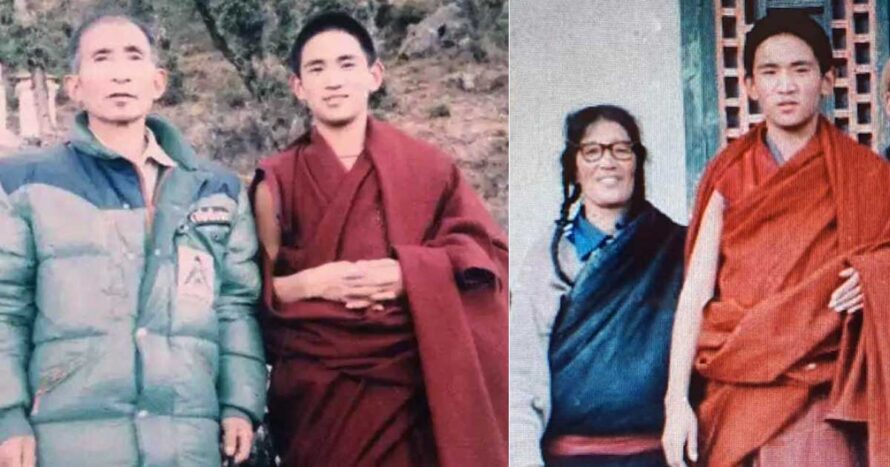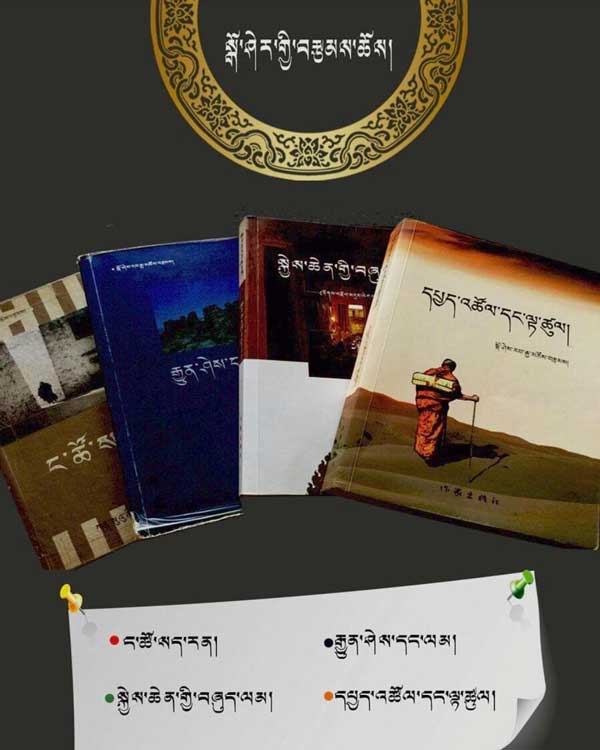
Chinese authorities have detained the prominent Tibetan Buddhist scholar and writer Go Sherab Gyatso, according to new information from sources.
The 45-year-old monk was detained in Chengdu by officials from the Tibet Autonomous Region on 26 October 2020, according to a Tibetan in exile who does not wish to be identified. This information has been provided only now, because Gyatso’s acquaintances hoped his release could be achieved without public attention.
Earlier Tibetan language media reports said Gyatso had been detained in January 2021.
No information about the circumstances of his detention or his current whereabouts was available. It is therefore still unclear as to the reason why TAR security personnel detained Gyatso when he is from Ngaba Tibetan and Qiang Autonomous Prefecture in Sichuan province.
Respected scholar

Some of the books written by Go Sherab Gyatso.Gyatso was born in Khashul (Chinese: Kaxiu) village in Ngaba. He became a monk in Kirti Monastery in his homeland, where he studied for some years before going to Lhasa, Tibet’s capital, to continue his studies in the two big monasteries of Drepung and Sera.
Gyatso is a prolific writer having published several books on Tibetan Buddhist philosophy, tradition, and culture. These include commentaries on the autobiography of the Tibetan Buddhist master Tsongkhapa, a book of advice by Sakya Pandita and Gedun Choephel’s “The Golden Surface,” the story of a cosmopolitan’s pilgrimage. He has also published critiques about the Tibetan monastic education system, calling for a broadening of the monastic community’s exposure.
His scholarship was highly respected, indicated by a master’s thesis titled “Go Sherab Gyatso and his academic thoughts” submitted in May 2019 by a student at Tibet University in Lhasa, a copy of which ICT has seen.
Days after his detention became public, an anonymous person had created a page on a Chinese social media platform compiling Gyatso’s writings.
Past imprisonments
Gyatso has also been an advocate of academic freedom in the monastic education setting. In the past, such advocacy led to his detention and imprisonment as well forced exile from his monastery. In his interview to the Tibet University student conducting master’s research, conducted in 2018, he mentions that he underwent “reform through labor” sessions from 20 March 1998 to 30 November 2001, without giving the reasons for it. A source said he was imprisoned during the period in Mianyang prison in Sichuan province.
A 2008 blog post by fellow Tibetan writer Jamyang Kyi appears to refer to this imprisonment of Gyatso by sharing a public letter, “To Go Sherab Gyatso la,” saying, “you had been accused of horrendous political crimes and had been sentenced to 3 years in prison.” One source confirmed Tibetan media reports which said that at that time, Gyatso had challenged the “patriotic re-education” campaign, the effort to adapt Tibetan Buddhism as practiced in his monastery to socialist norms.
In 2008, he was detained in Lhasa and imprisoned for a year around the time of the mass protests across the Tibetan Plateau, sources said, although they did not explain the reason for his detention.
“I Have to Speak Out”
Similarly, in 2013, he objected when his Kirti Monastery’s management announced a new regulation requiring all writings and publications to be pre-approved by the “Education Management Department” of the monastery before distribution. He wrote a lengthy essay outlining how this decision was shortsighted and counterproductive to the long-term education system of the monastery.
In the essay titled, “I Have to Speak Out” (translation posted by High Peaks Pure Earth), Gyatso said, “I am scared that this newly-issued regulation may become an agent that can crush the small field on which young monks’ dreams grow. The desire of the monks to express things and their wish to accomplish things must be considered as progress and hope for a good result. It is your responsibility to nurture these new shoots and not consider them as something dangerous. What can be more fearful, shameful and irresponsible than to look at them as something that is to be destroyed and maimed?”
However, the monastery began to put pressure on the monastic community and eventually Gyatso “had to separate” from his monastery, as he told the Tibet University student.
Between 2013 and 2016 Gyatso travelled all over eastern Tibet visiting different monasteries in the region of Kham to continue his studies and writings. In 2016, he went to the Sun Yat-sen University in China to study the history of Western philosophy, according to the Tibet University student.
Calling for Go Sherab Gyatso’s release
Under the current conditions of oppressive Chinese rule, Tibetan writers and scholars are increasingly facing reduced space to express themselves, even on non-political subjects. The State Department’s 2020 human rights report for Tibet, released on 30 March this year, says, “The state-run TAR Academy of Social Science continued to encourage scholars to maintain ‘a correct political and academic direction’ in its July conference to ‘improve scholars’ political ideology’ and ‘show loyalty to the party’ under the guidance of [Chinese President] Xi Jinping.”
Chinese authorities continue to detain Tibetan scholars without any explanation. The 2020 State Department report observes, “Derung Tsering Dhundrup, a senior Tibetan scholar who was also the deputy secretary of the Sichuan Tibet Studies Society, was reportedly detained in June 2019, and his whereabouts remained unknown as of December.”
In its 2015 report, “The teeth of the storm,” the International Campaign for Tibet documented the cases of a young generation of Tibetan intellectuals, artists, bloggers, writers and singers who have faced life-altering consequences of torture and imprisonment for conveying their views or simply singing songs. The report includes details on the cases of 11 imprisoned writers and intellectuals and 10 singers who have faced persecution and imprisonment.
ICT is concerned that Go Sherab Gyatso has been subjected to enforced disappearance and arbitrary detention. We call for his release, and we call on the UN and the international community to ask China to provide information on the circumstances of Go Sherab Gyatso’s detention, his health condition and treatment.